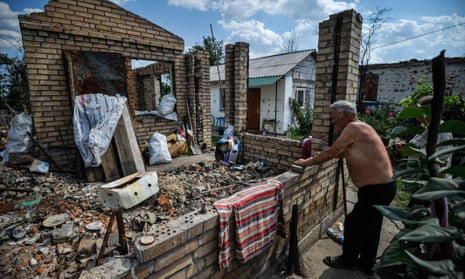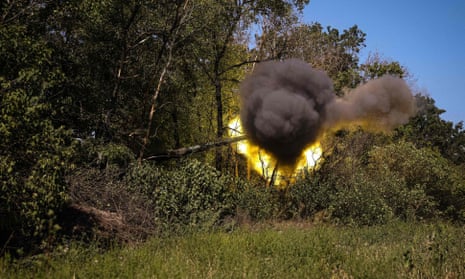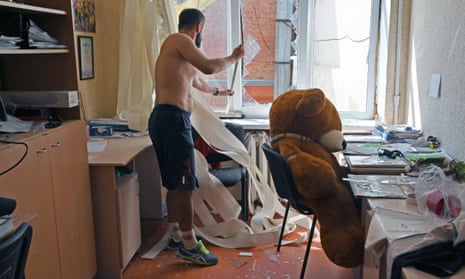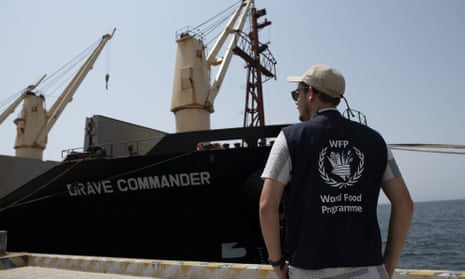
Kremlin-appointed Kherson leader has fled to Russia – reports
A Moscow-installed leader of occupied Kherson has reportedly fled to Russia, one day after Kyiv announced it had begun its long-awaited counter attack aimed at taking back the southern region from Russian forces.
Kirill Stremousov, who was appointed deputy head of the Russian-backed Kherson military-civilian administration, has published regular video updates to state-owned Russian news outlets and his Telegram account.

But a Ukrainian activist, Serhii Sternenko, has claimed Stremousov is no longer in Kherson and has instead been filming his recent video updates somewhere near the Cathedral of Annunciation in Voronezh in Russia, which can be seen in the background.
Voronezh is almost 500 miles from Kherson and about 120 miles from the border with Ukraine.
In a series of tweets, Sternenko wrote:
Traitor to Ukraine and collaborator Stremousov escaped from Kherson and says that Kherson will forever remain Russian … from Voronezh to Russia.
1/2
️Зрадник України і колаборант Стрємоусов втік з Херсону та розповідає, що росія у Херсоні назавжди… із Воронєжа на росіїЗавдяки багатьом небайдужим громадянам вдалось встановити, що вчора та сьогодні Стрємоусов записував свої відеозвернення із готелю Marriott у м. Воронєж pic.twitter.com/Hie6e3QKTy
— Serhii Sternenko (@sternenko) August 30, 2022
He went on to claim that Stremousov was filming his videos from a Marriott hotel in Voronezh.
2/2
на проспекті Революції, 38.На задньому тлі видно і Благовіщенський собор Воронєжа, і таку ж жовто-світлу чотириповерхову будівлю на вул. Революції, 29 (технікум будівельних технологій). Позаду також є Воронезьке водосховище.
Дякую усім, хто долучився до пошуків🤝🇺🇦 pic.twitter.com/IJ8snLb29i
— Serhii Sternenko (@sternenko) August 30, 2022
Updated at 11.47 EDT
Key events
Show key events only
Please turn on JavaScript to use this feature
Closing summary
It’s 9pm in Kyiv. Here’s where we stand:
-
Ukraine’s president, Volodymyr Zelenskiy, has urged Russian soldiers to flee for their lives after his forces launched an offensive to retake southern Ukraine. A senior presidential adviser, Oleksiy Arestovych, cautioned Ukrainians not to expect rapid gains and described the offensive as a “slow operation to grind the enemy”.
-
The former head of Britain’s secret intelligence service, MI6, has welcomed Ukraine’s counterattacks in Kherson, saying it is a key moment in the war. Sir Alex Younger told the BBC that the fightback from Kyiv showed the two opposing forces had “reached some kind of balance, which is an unexpected and frankly welcome situation”.
-
The Kremlin has insisted that its so-called “special military operation” in Ukraine is going to plan despite the news that Kyiv’s troops have launched a long-awaited counteroffensive in the south of the country. Kremlin spokesperson Dmitry Peskov said: “The special military operation continues, it continues methodically, and in coordination with the current plans. All objectives will be fulfilled.”
-
A Moscow-installed leader of occupied Kherson has reportedly fled to Russia after Kyiv announced it had begun its long-awaited counterattack aimed at taking back the southern region from Russian forces. When asked by the Guardian about his location, Kirill Stremousov said he was currently “travelling around Russian cities, meeting different people for work”.
-
At least four people were killed and four wounded in Russian shelling of Kharkiv, the regional governor said. Writing on the Telegram messaging app, Oleh Synehubov said: “As a result of the shelling of the central part of Kharkiv, at least four people died and four more were injured.”
-
Volodymyr Zelenskiy has met the director general of the International Atomic Energy Agency (IAEA), Rafael Grossi, and his delegation ahead of the group’s visit to the Russian-held Zaporizhzhia nuclear power plant in southern Ukraine. A key adviser to Ukraine’s president accused Russian forces of deliberately shelling corridors for the IAEA inspectors to force them through Crimea and parts of the Luhansk and Donetsk regions temporarily occupied by Moscow’s forces.
-
The European Commission has said it will donate 5.5m potassium iodide tablets to Ukraine amid fears that fighting in the area of the Russian-occupied Zaporizhzhia nuclear power plant could lead to nuclear catastrophe. The commission said it had received a request from the Ukrainian government for potassium iodide tablets “as a preventative safety measure” to increase the level of protection around the nuclear plant.
-
The first shipment of grain from Ukraine to the drought-stricken Horn of Africa since the war began has docked in Djibouti. The UN-chartered vessel Brave Commander is carrying 23,000 tonnes of Ukrainian wheat and will soon be followed by another carrying 7,000 tonnes. The total shipment, which will be unloaded in Djibouti and transported to Ethiopia, is enough to feed 1.5m people for a month.
-
Ukraine has deployed a fleet of dummy rockets to trick Russian forces into wasting expensive long-range missiles on pointless targets, according to reports. At least 10 Russian cruise missiles have reportedly been fired by Moscow’s naval fleet in the Black Sea at the dummy targets, which are made of wood but look like US-supplied advanced rocket launcher systems when spotted by Russian drones, the Washington Post reports.
-
Germany and France have issued a joint warning against a ban on tourist visas for Russians, saying such a step would be counter-productive. The split on tourist visas will be at the heart of a meeting of the bloc’s foreign ministers in Prague on Tuesday and Wednesday as they discuss what further steps they can take to sanction Russia for its six-month old invasion of Ukraine.
-
The UN’s cultural agency has said it supports a bid by Ukraine to put its port city of Odesa on the Unesco world heritage list of protected sites. The UN agency also said it wants to add Odesa, Kyiv and Lviv to the list of world heritage sites “in danger”.
That’s it from me, Léonie Chao-Fong, and the Russia-Ukraine war blog today. Thanks for following along. I’ll be back tomorrow.
Updated at 14.37 EDT
Here’s more on the meeting between Volodymyr Zelenskiy and the head of the International Atomic Energy Agency (IAEA), Rafael Grossi, in Kyiv today.
Grossi arrived in the Ukrainian capital late on Monday at the head of a 14-strong team before a visit to the Russian-occupied Zaporizhzhia nuclear power plant.
Zelenskiy said the mission was “probably one of the top-priority questions regarding the safety of Ukraine and the world today”, and called for the “immediate de-militarisation of the plant” and its transfer to “full Ukrainian control”.
The Ukrainian president said he hoped the delegation would “find an opportunity, thanks to our special services, thanks to the security corridors, to get to the station and do the best to avoid all those threats on a global scale”.
He also urged the mission to do more than inspect the plant, saying that strategic decisions were required “regarding the urgent demilitarisation of the station, the withdrawal of all, any, military personnel of the Russian Federation with explosives, with any kind of weapon”.
Updated at 13.58 EDT
The UN’s cultural agency has said it supports a bid by Ukraine to put its port city of Odesa on the Unescoworld heritage list of protected sites.
The historic centre of Odesa has already been “struck by artillery fire” and is “located only a few dozen kilometres from the front line”, the agency said in a statement.
The statement followed a meeting of the agency’s director, Audrey Azoulay, and Ukraine’s culture minister, Oleksandr Tkachenko, in Paris. The agency added:
On 24 July 2022, part of the large glass roof and windows of Odesa’s Museum of Fine Arts, inaugurated in 1899, were destroyed.
It said it had mobilised experts to support Ukraine so that the nomination can be examined urgently by World Heritage Committee member states.
The UN agency also said it wants to add Odesa, Kyiv and Lviv to the list of world heritage sites “in danger”.
Updated at 13.21 EDT
Russian state prosecutors have requested a 24-year prison term for the former journalist, Ivan Safronov, who is on trial for treason, his defence team has told Russian media.
Safronov, 32, was one of Russia’s most respected journalists covering defence for the Kommersant and Vedomosti newspapers. He was arrested in July 2020 after leaving journalism to serve as an aide to the head of Russia’s space agency.
He has been accused by Russia’s FSB security service of collecting military secrets about Russian arms sales in the Middle East and Africa and handing them over to the Czech Republic. Safronov has denied the charges and described the trial as “a complete travesty of justice”.
Speaking to the Russian state-owned news agency, Ria, after a closed-door hearing, Safronov’s lawyer, Dmitry Katchev, said:
The prosecutor asked to sentence Ivan to 24 years in a strict regime penal colony.
Safronov’s previous lawyer, Yevgeny Smirnov, said on Facebook that his former client had turned down an offer of 12 years in jail in return for a guilty plea.
The verdict in his case will be announced on 5 September, Russian news agencies said.
Updated at 13.16 EDT
Ukraine’s president, Volodymyr Zelenskiy, has met the director general of the International Atomic Energy Agency (IAEA), Rafael Grossi, and his delegation ahead of the group’s visit to the Russian-held Zaporizhzhia nuclear power plant in southern Ukraine.
From the Ukrainian broadcaster Suspilne:
Updated at 12.32 EDT
 Pjotr Sauer
Pjotr Sauer
The deputy head of the Russian-installed administration in Ukraine’s occupied Kherson region, Kirill Stremousov, said in a telephone interview that “everything in Kherson was under control”, claiming that Ukrainian spies and saboteurs were killed near Kherson’s Tavriiskyi neighbourhood on Tuesday.
Earlier in the day, reports emerged that Stremousov had left Kherson after a video he posted appeared to indicate he was located in Voronezh, a Russian city some 600 miles from Kherson.
When asked by the Guardian about his location, Stremousov said he was currently “travelling around Russian cities, meeting different people for work”.
He said:
I don’t have to sit [in Kherson]. I am the deputy head of the region and have the opportunity to move around … These are working trips.
“Kherson will remain my base,” he added, denying he left Kherson out of safety concerns.
Stremousov became the most senior Russian-appointed official in Kherson after the local governor, Volodymyr Saldo, was taken to hospital amid a suspected poisoning earlier in the summer.
Stremousov’s apparent departure from Kherson comes after another Russian-appointed official in the region, Alexei Kovalev, was shot dead in his home over the weekend.
In the past months, a number of Ukrainian nationals appointed by Russian forces in occupied territory have been killed or wounded in apparent partisan attacks.
Updated at 12.28 EDT
Kremlin-appointed Kherson leader has fled to Russia – reports
A Moscow-installed leader of occupied Kherson has reportedly fled to Russia, one day after Kyiv announced it had begun its long-awaited counter attack aimed at taking back the southern region from Russian forces.
Kirill Stremousov, who was appointed deputy head of the Russian-backed Kherson military-civilian administration, has published regular video updates to state-owned Russian news outlets and his Telegram account.
But a Ukrainian activist, Serhii Sternenko, has claimed Stremousov is no longer in Kherson and has instead been filming his recent video updates somewhere near the Cathedral of Annunciation in Voronezh in Russia, which can be seen in the background.
Voronezh is almost 500 miles from Kherson and about 120 miles from the border with Ukraine.
In a series of tweets, Sternenko wrote:
Traitor to Ukraine and collaborator Stremousov escaped from Kherson and says that Kherson will forever remain Russian … from Voronezh to Russia.
1/2
️Зрадник України і колаборант Стрємоусов втік з Херсону та розповідає, що росія у Херсоні назавжди… із Воронєжа на росіїЗавдяки багатьом небайдужим громадянам вдалось встановити, що вчора та сьогодні Стрємоусов записував свої відеозвернення із готелю Marriott у м. Воронєж pic.twitter.com/Hie6e3QKTy
— Serhii Sternenko (@sternenko) August 30, 2022
He went on to claim that Stremousov was filming his videos from a Marriott hotel in Voronezh.
2/2
на проспекті Революції, 38.На задньому тлі видно і Благовіщенський собор Воронєжа, і таку ж жовто-світлу чотириповерхову будівлю на вул. Революції, 29 (технікум будівельних технологій). Позаду також є Воронезьке водосховище.
Дякую усім, хто долучився до пошуків🤝🇺🇦 pic.twitter.com/IJ8snLb29i
— Serhii Sternenko (@sternenko) August 30, 2022
Updated at 11.47 EDT
A selection of images showing recent developments in Ukraine have dropped on the picture wires.
 A man looks at his destroyed house in the village of Andriivka. Photograph: Sergei Chuzavkov/AFP/Getty Images
A man looks at his destroyed house in the village of Andriivka. Photograph: Sergei Chuzavkov/AFP/Getty Images Ukrainian fighters fire a Polish howitzer at a position on the frontline in the Donetsk region on Monday. Photograph: Anatolii Stepanov/AFP/Getty Images
Ukrainian fighters fire a Polish howitzer at a position on the frontline in the Donetsk region on Monday. Photograph: Anatolii Stepanov/AFP/Getty Images A teacher removes broken glass from an office in a public school following an air strike in Kharkiv on Saturday. Photograph: Sergey Bobok/AFP/Getty Images
A teacher removes broken glass from an office in a public school following an air strike in Kharkiv on Saturday. Photograph: Sergey Bobok/AFP/Getty Images A member of staff for the World Food Programme looks on as the MV Brave Commander, carrying grain from Ukraine, arrives in Djibouti. Photograph: World Food Programme/Reuters
A member of staff for the World Food Programme looks on as the MV Brave Commander, carrying grain from Ukraine, arrives in Djibouti. Photograph: World Food Programme/Reuters
Updated at 11.40 EDT
The former head of Britain’s secret intelligence service, MI6, has welcomed Ukraine’s counterattacks in Kherson, saying it is a key moment in the war.
Sir Alex Younger told the BBC that the fightback from Kyiv showed the two opposing forces had “reached some kind of balance, which is an unexpected and frankly welcome situation”.
He added that western help had strengthened Ukrainian capability and that there was a long-term trend showing Russian military capability had slowly weakened. He said the new offensive in Kherson from Zelenskiy’s forces was “all about the urge of Ukraine to demonstrate they can get on the front foot”.
Updated at 10.46 EDT
Summary of the day so far
It’s nearly 5.30pm in Kyiv. Here’s where we stand:
-
Ukraine’s president, Volodymyr Zelenskiy, has urged Russian soldiers to flee for their lives after his forces launched an offensive to retake southern Ukraine. A senior presidential adviser, Oleksiy Arestovych, told Ukrainians not to expect rapid gains and described the offensive as a “slow operation to grind the enemy”.
-
The Kremlin has insisted that its so-called “special military operation” in Ukraine is going to plan despite the news that Kyiv’s troops have launched a long-awaited counteroffensive in the south of the country. Kremlin spokesperson Dmitry Peskov said: “The special military operation continues, it continues methodically, and in co-ordination with the current plans. All objectives will be fulfilled.”
-
Kherson has been hit by a partial power outage and a partial shutdown of the water supply, Russian state news agencies have cited pro-Russian officials as saying. Traffic lights and building lights have also been reported going off in the Moscow-held region, according to Russian media.
-
At least four people were killed and four wounded in Russian shelling of Kharkiv, the regional governor said. Writing on the Telegram messaging app, Oleh Synehubov said: “As a result of the shelling of the central part of Kharkiv, at least 4 people died and 4 more were injured.”
-
A team of inspectors from the UN nuclear watchdog have arrived in Kyiv en route to inspect the Zaporizhzhia nuclear power plant in southern Ukraine. The International Atomic Energy Agency (IAEA) chief, Rafael Grossi, said a team will visit the plant from Wednesday to Saturday. A key adviser to Ukraine’s president accused Russian forces of deliberately shelling corridors for the IAEA inspectors to force them through Crimea and parts of the Luhansk and Donetsk regions temporarily occupied by Moscow’s forces.
-
The European Commission has said it will donate 5.5m potassium iodide tablets to Ukraine amid fears that fighting in the area of the Russian-occupied Zaporizhzhia nuclear power plant could lead to nuclear catastrophe. The Commission said it had received a request from the Ukrainian government for potassium iodide tablets “as a preventative safety measure” to increase the level of protection around the nuclear plant.
-
The first shipment of grain from Ukraine to the drought-stricken Horn of Africa since the war began has docked in Djibouti. The UN-chartered vessel Brave Commander is carrying 23,000 tonnes of Ukrainian wheat and will soon be followed by another carrying 7,000 tonnes. The total shipment, which will be unloaded in Djibouti and transported to Ethiopia, is enough to feed 1.5m people for a month.
-
Ukraine has deployed a fleet of dummy rockets to trick Russian forces into wasting expensive long-range missiles on pointless targets, according to reports. At least 10 Russian cruise missiles have reportedly been fired by Moscow’s naval fleet in the Black Sea at the dummy targets, which are made of wood but look like US-supplied advanced rocket launcher systems when spotted by Russian drones, the Washington Post reports.
-
Russia is reportedly struggling to find more soldiers to fight in Ukraine and has expanded recruitment efforts by eliminating the upper age limit and by tapping into prisons. The Pentagon believes that any more recruits added may not effectively expand overall combat power by the end of the year, according to a US official.
-
Several brigades of the Ukrainian armed forces increased the weight of artillery fires in frontline sectors across southern Ukraine early on Monday, according to British intelligence. Ukrainian long-range precision strikes continue to disrupt Russian resupply; however, it is not yet possible to confirm the extent of Ukrainian advances, the UK Ministry of Defence said in its latest report.
-
Germany and France have issued a joint warning against a ban on tourist visas for Russians, saying such a step would be counter-productive. The split on tourist visas will be at the heart of a meeting of the bloc’s foreign ministers in Prague on Tuesday and Wednesday, as they discuss what further steps they can take to sanction Russia for its six-month old invasion of Ukraine.
Hello, it’s Léonie Chao-Fong still with you today on the Russia-Ukraine war blog. Feel free to get in touch on Twitter or via email.
Ukraine’s southern region of Kherson has been hit by a partial power outage, Russian state news agencies have cited pro-Russian officials as saying.
Russian media also reported a partial shutdown of the water supply, as well as traffic lights and building lights going off.
It comes after Ukrainian forces launched their long-awaited counteroffensive to take back the southern region from Russia.
Russia has condemned the destruction of Soviet war memorials in the three Baltic states and accused them of persecuting their Russian-speaking minorities.
In a statement, the Russian foreign ministry accused Latvia, Lithuania and Estonia of being guilty of xenophobia and said they were treating their ethnic Russian minorities as “second-class people”.
It claimed Russian-language media, kindergartens and schools were being shut down.
Such “Russophobic approaches” will “certainly affect the state of bilateral relations with these countries, which are already in complete decline”, the ministry said.
First Ukraine grain ship docks in Africa
The first shipment of grain from Ukraine to the drought-stricken Horn of Africa since the war began has docked in Djibouti.
The UN-chartered vessel Brave Commander, carrying 23,000 tonnes of Ukrainian wheat, set sail from the Ukrainian port of Yuzhne, east of Odesa, two weeks ago.
The vessel is the first specially chartered by the UN’s World Food Programme to unblock food shipments stuck after Russia’s invasion of Ukraine.
 The Brave Commander bulk carrier makes its way from the Pivdennyi Seaport near Odesa, Ukraine, on 16 August. Photograph: Nina Lyashonok/AP
The Brave Commander bulk carrier makes its way from the Pivdennyi Seaport near Odesa, Ukraine, on 16 August. Photograph: Nina Lyashonok/AP
It will soon be followed by another carrying 7,000 tonnes. The total shipment, which will be unloaded in Djibouti and transported to Ethiopia, is enough to feed 1.5 million people for a month.
Michael Dunford, the UN’s World Food Programme director for eastern Africa, said:
This shipment, the first of many we hope, will allow WFP to deliver this grain to 1.53 million people in Ethiopia and cover their needs for a month. It’s a start but we must continue to keep the food flowing to save lives across the region.
Updated at 09.19 EDT
EU to distribute 5m iodide tablets to Ukrainians amid nuclear risk
The European Commission has said it will donate 5.5m potassium iodide tablets to Ukraine amid fears that fighting in the area of the Russian-occupied Zaporizhzhia nuclear power plant could lead to nuclear catastrophe.
The Commission said it had received a request from the Ukrainian government for potassium iodide tablets “as a preventative safety measure” to increase the level of protection around the nuclear plant.
The tablets would be used “in limited scenarios to avoid that inhaled or swallowed radioactive iodine is absorbed by the thyroid”, the commission said.
The EU is “pre-emptively” delivering the potassium iodide tablets to Ukraine to offer people protection “in case of exposure to high levels of radiation”, the commissioner for crisis management, Janez Lenarčič, said in a statement.
He added:
No nuclear power plant should ever be used as a war theatre. It is unacceptable that civilian lives are put in danger.
Updated at 08.37 EDT
A key adviser to Ukraine’s president has accused Russian forces of deliberately shelling corridors for a team of inspectors from the UN nuclear watchdog to the Zaporizhzhia nuclear power plant in southern Ukraine.
Mykhailo Podolyak said Russia was attempting to force the mission from the International Atomic Energy Agency (IAEA) through Crimea and parts of the Luhansk and Donetsk regions temporarily occupied by Moscow’s forces.
He also reiterated Ukraine’s call to demilitarise the area around the Russian-controlled Zaporizhzhia nuclear plant.
🇷🇺 is deliberately shelling corridors for IAEA mission to reach ZNPP. All to offer passage through Crimea/ORDLO. 🇺🇦 position is the same. Access only through controlled territory of 🇺🇦. Nuclear power plant demilitarization. Ru-troops withdrawal. Only ua-personnel at the station.
— Михайло Подоляк (@Podolyak_M) August 30, 2022
Ukraine using decoy rockets to trick Russia into wasting weapons, reports say
Ukraine has deployed a fleet of dummy rockets to trick Russian forces into wasting expensive long-range missiles on pointless targets, according to reports.
The decoys are made of wood but look like US-supplied advanced rocket launcher systems when spotted by Russian drones, the Washington Post reports.
At least 10 Russian cruise missiles have reportedly been fired by Moscow’s naval fleet in the Black Sea at the dummy targets, a senior Ukrainian official told the paper.
A source said:
When the UAVs see the battery, it’s like a VIP target.
The initial success of the replicas has left Ukraine to make more of these wooden decoys in a bid to neutralise Russia’s artillery advantage on the battlefield.
In addition, the destruction of Ukraine’s fleet of fake Himars may have been behind Russia’s claims that it has taken out a large number of the systems.
Updated at 10.18 EDT
Kremlin says military operation going to plan as Ukrainian counterattack begins
The Kremlin has insisted that its so-called “special military operation” in Ukraine is going to plan despite the news that Kyiv’s troops have launched a long-awaited counteroffensive in the south of the country.
At his regular briefing with reporters, Kremlin spokesperson Dmitry Peskov was asked to respond to Volodymyr Zelenskiy’s comments that Russian troops should flee after his military reportedly broke through several of their defences on Tuesday.
Peskov replied:
The special military operation continues, it continues methodically, and in co-ordination with the current plans. All objectives will be fulfilled.
He also commented on calls by some European leaders for a ban on tourist visas for Russians, describing the proposals as “irrational” and the latest manifestation of the west’s anti-Russian agenda.
He said Europe’s actions towards Russia were “bordering on insanity” adding:
Of course, such decisions cannot go unanswered.
Updated at 07.50 EDT
Ukrainian troops have launched a counterattack in southern Ukraine, Volodymyr Zelenskiy has said, as he vowed to take back Russian-controlled areas, starting with Kherson.
The Ukrainian president told the Russian military to flee after his military broke through several Russian defences on Tuesday.
“There will be no place [for Russian troops] on Ukrainian land,” he said during his latest address posted to Telegram.
Zelenskiy vows to take back Russian-controlled areas in counteroffensive – video
Radiation levels at the Moscow-occupied Zaporizhzhia nuclear power plant remain normal, according to Russia’s defence ministry.
In a statement, the ministry accused Ukrainian forces of firing two artillery shells into the territory of the nuclear power plant.
It also claimed that it had a downed Ukrainian drone had crashed into the roof of a building storing nuclear fuel and radioactive waste.
It is not possible to independently verify these claims.





GIPHY App Key not set. Please check settings